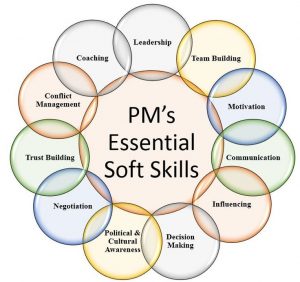Although a broad range of skills is needed to effectively manage the people, process, and technical aspects of any project, it becomes clear there is a set of key skills that each project manager should have.
Although these skill categories are not necessarily exclusive of each other, let’s group them into five categories to streamline our review and discussion:
1. Project Management Fundamentals—The “science” part of project management, covered in this book, including office productivity suite (such as Microsoft Office, email, and so on) and project management software skills.
2. Business Management Skills—Those skills that would be equally valuable to an “operations” or “line-of-business” manager, such as budgeting, finance, procurement, organizational dynamics, team
development, performance management, coaching, and motivation.
3. Technical Knowledge—The knowledge gained from experience and competence in the focal area of the project. With it, you greatly increase your “effectiveness” as a project manager. You have more credibility, and you can ask better questions, validate the estimates and detail plans of team members, help solve technical issues, develop better solutions, and serve more of a leadership role.
4. Communication Skills—Because communication is regarded as the most important project management skill by the Project Management Institute (PMI), I feel it is important to separate these out. Skills included in this category include all written communication skills (correspondence, emails, documents), oral communication skills, facilitation skills, presentation skills, and—the most valuable—active listening. Active listening can be defined as “really listening” and the ability to listen with focus, empathy, and the desire to connect with the speaker.
5. Leadership Skills—This category overlaps with some of the others and focuses on the “attitude” and “mindset” required for project management. However, it also includes key skills such as interpersonal and general people skills, adaptability, flexibility, people management, degree of customer orientation, analytical skills, problem-solving skills, and the ability to keep the “big picture” in mind.
The specific combination of skills that are required for a project manager to be successful on a given project vary depending on the size and nature of the project. For example, as a general rule, on larger projects, technical knowledge is less important than competence in the other four skill categories.
One doesn't have to be outstanding in all the above mentioned categories to be successful as a project manager. The key is that the project manager has the right mix of skills to meet the needs of the given project. In addition, a self-assessment against these skill categories enables you to leverage your strengths, compensate for your deficiencies, and focus your self-improvement program.
Having the desired skill set is not only sufficient to be successful as a project manager and certain qualities are also required. These we'll discuss in the next post.
Although these skill categories are not necessarily exclusive of each other, let’s group them into five categories to streamline our review and discussion:
1. Project Management Fundamentals—The “science” part of project management, covered in this book, including office productivity suite (such as Microsoft Office, email, and so on) and project management software skills.
2. Business Management Skills—Those skills that would be equally valuable to an “operations” or “line-of-business” manager, such as budgeting, finance, procurement, organizational dynamics, team
development, performance management, coaching, and motivation.
3. Technical Knowledge—The knowledge gained from experience and competence in the focal area of the project. With it, you greatly increase your “effectiveness” as a project manager. You have more credibility, and you can ask better questions, validate the estimates and detail plans of team members, help solve technical issues, develop better solutions, and serve more of a leadership role.
4. Communication Skills—Because communication is regarded as the most important project management skill by the Project Management Institute (PMI), I feel it is important to separate these out. Skills included in this category include all written communication skills (correspondence, emails, documents), oral communication skills, facilitation skills, presentation skills, and—the most valuable—active listening. Active listening can be defined as “really listening” and the ability to listen with focus, empathy, and the desire to connect with the speaker.
5. Leadership Skills—This category overlaps with some of the others and focuses on the “attitude” and “mindset” required for project management. However, it also includes key skills such as interpersonal and general people skills, adaptability, flexibility, people management, degree of customer orientation, analytical skills, problem-solving skills, and the ability to keep the “big picture” in mind.
The specific combination of skills that are required for a project manager to be successful on a given project vary depending on the size and nature of the project. For example, as a general rule, on larger projects, technical knowledge is less important than competence in the other four skill categories.
One doesn't have to be outstanding in all the above mentioned categories to be successful as a project manager. The key is that the project manager has the right mix of skills to meet the needs of the given project. In addition, a self-assessment against these skill categories enables you to leverage your strengths, compensate for your deficiencies, and focus your self-improvement program.
Having the desired skill set is not only sufficient to be successful as a project manager and certain qualities are also required. These we'll discuss in the next post.


No comments:
Post a Comment